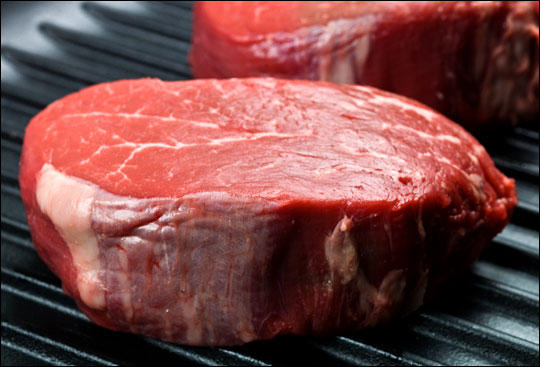In Checkout Line, Lou Bendrick cooks up answers to reader questions about how to green their food choices, and other diet-related quandaries.

Hi,
Something I’ve been pondering a lot lately is the whole “free-range” meat market. After reading The Omnivore’s Dilemma, I have a lot of doubts as to whether meat labeled “all natural” and “free range” is actually those things. On the one hand, I want to support the market for sustainably raised meat, but on the other I want to be sure I’m getting what the label says and not factory-farmed animals. So, any advice? Am I better off avoiding meat all together? Help!
Martine W.
Washington University in St. Louis, Class of 2008
Martine,
Given all the eco-labels out there, some of them downright sleazy, you just don’t know what you’re getting when it comes to casual encounters with meat. Because you’ve read The Omnivore’s Dilemma, it’s evident that a smart lady like you is looking for a deep, meaningful relationship with food. (Momma always said you’d be better off finding true love in the library than in a bar.)
First things first: “All natural” and “free range” are tired, corny lines, so roll your eyes when you hear them. It’s as if a guy in a bad suit and a cloud of Jovan Musk had just said, “Call me milk; I’ll do your body good.” Meat market, indeed!
It is equally unlikely that “all natural” meat will do your body good. “Natural” is merely marketing frou-frou, with no official certification and little oversight behind it. Although natural meat and poultry cannot contain artificial flavors, colors, or preservatives and it may only be minimally processed, it still may come from a concentrated animal feeding operation (CAFO) that would make Upton Sinclair gag.
In terms of misleading labels, I consider “free range” another bad actor. It applies to poultry and means that the birds must have “access” to the outdoors — but as Pollan showed in The Omnivore’s Dilemma — it doesn’t ensure that they actually spend time outside. Free-range poultry or eggs might very well come from birds that never stretched their legs or saw the sun.
If you want to support sustainably raised meat, I’d suggest that you go local. Go to farmers markets and look for small-scale farmers who treat their animals and the earth — and therefore you — with dignity. To find out whether their meat is worth your time or respect, you will have to ask questions. If at all possible, pay a visit to a local farm where you’d like to buy meat and see first hand how the animals and the land are treated. To find local and sustainable meat, try the following resources: You can plug your zip code into Sustainable Table’s “Eat Well Guide” and LocalHarvest’s database. The Eatwild directory will help you find meat from animals that actually spent time outside grazing on pasture. For chicken, also try the American Pastured Poultry Producers Association.
Although some grocery stores and co-ops are starting to carry local and sustainable meat, it might be hard to find. It is likely that you’ll have to ferret out and reject the meaty equivalent of the smarmy guy on the barstool — the lump of CAFO chicken loudly proclaiming that it’s “hormone free.” Federal regulations prohibit commercial growers from feeding hormones and steroids to any chicken, so claiming that your chicken is “hormone free” is like a man claiming to understand women because he had a mother.
To be discerning, educate yourself about eco-labels. I like the Greener Choices Eco Labels Center. For a quick tutorial, go into their Virtual Kitchen and start clicking on the meat and the eggs. Eggs have a dizzying number of labels these days.
If local and sustainable options aren’t available and you still want meat for dinner, you might employ a process of elimination. When I’m in this bind, I look for the USDA certified organic label, which at least guarantees that the animals receive feed free of certain chemicals, chemical fertilizers, pesticides, and drugs (organic code also stipulates that cows get “access to pasture” and chickens have outdoor access, but those rules have been interpreted liberally).
I also look for the Certified Humane label, which means that animal welfare was kept in mind. Failing these options, I opt for the tofu, which brings me to your final question about whether or not you’d be better off without meat.
If your primary concern is global warming, then sidle up to the tempeh. In their study “Diet, Energy and Global Warming” [PDF], Gidon Eshel and Pamela Martin, assistant professors of geophysics at the University of Chicago, showed that, for a person who eats the average American diet, becoming a vegetarian is a more effective way to reduce your global-warming footprint than driving a hybrid car.
I called up Eshel (he lives nearby) and asked him if it’s possible, given the option of more sustainably raised meat, to eat meat with little impact on the environment. He thought a very small number of people could pull it off. People, for example, who live in very remote areas where very careful cattle ranching prevails would have little impact. “If Dick Cheney finally does us the hugest favor he can ever do and retires to his ranch in Wyoming — he is able to do that,” says Eshel. “But even in this highly idealized example, we’re not out of the woods yet. What about biodiversity? When you put cattle on the land you undermine biodiversity. I’m sure Dick Cheney would tell you that this is an additional benefit to eating locally — undermining biodiversity.”
And who says scientists don’t have a sense of humor!
It’s also worth noting that Eshel, a former cattle rancher, gave up meat 25 years ago not for environmental reasons, but for ethical ones. “One visit to a modern slaughterhouse is enough to turn the most rabid meat eater into a pacified vegetarian,” he said. “It is horrific.”
Of course, in addition to environmental and ethical reasons to give up meat, there are dietary ones: There’s a reason that you don’t see the heart-smart icon on restaurant menus next to the bacon-wrapped filet mignon.
That said, perhaps eating meat doesn’t have to be an all-or-nothing proposition: I skip meat a few times a week and make sure the meat that I do eat is chosen consciously. And even then, I’m only human; I’ve made some bad choices in the heat of the moment at the meat market. Still, the more I learn about this subject, the less I respect myself the morning after a cheap, meaningless flirtation with mystery bacon.
Congrats on your recent graduation, Martine, and good luck. I know that cultivating an intimate relationship with food takes a lot of work, but as Momma also said, “Nothing worth having comes easy.” (She also said that nothing good happens after midnight, but let’s ignore that one.)
Respectfully,
Lou Bendrick, meat apologist


